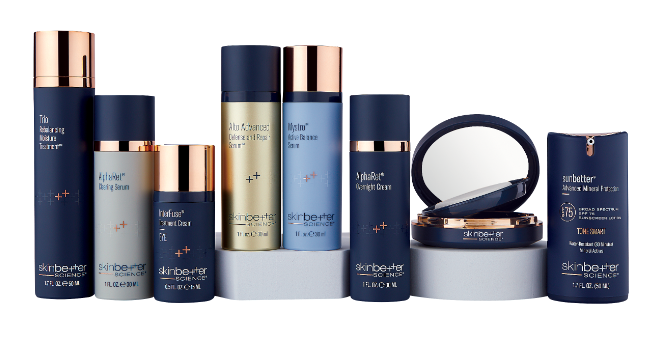Have you ever wondered how the ancient Egyptians achieved such flawless skin, or how a simple application of aloe vera can soothe a sunburn? The answers lie in the fascinating world of natural skin science, a field that harnesses the power of nature to promote healthy and radiant skin.

Image: bvaesthetics.com
Natural skin science isn’t simply about using ingredients derived from plants; it’s about understanding how these ingredients interact with your skin at a molecular level. By exploring the mechanisms behind natural remedies, we can unlock the secrets to achieving skin that is both beautiful and deeply nurtured.
The Ancient Roots of Natural Skin Science
The use of natural ingredients for skincare dates back to ancient civilizations. In ancient Egypt, Cleopatra famously used milk baths to soften her skin, a practice that drew on the lactic acid present in milk to gently exfoliate and moisturize. Throughout history, cultures worldwide have developed their own unique traditions for skincare, incorporating ingredients like turmeric, clay, and rosewater, each with their own specific properties.
Understanding the Skin’s Natural Barrier
Our skin is the body’s first line of defense against the elements, and its outermost layer, the epidermis, is equipped with a protective barrier known as the stratum corneum. This barrier acts like a brick wall, with lipids as the mortar holding the “bricks” of skin cells together. The strength and integrity of this barrier are crucial for healthy skin.
Natural skin science emphasizes the importance of supporting this natural barrier. Instead of stripping away the skin’s protective layer with harsh chemicals, natural ingredients focus on replenishing its natural lipids and promoting a healthy pH balance. By effectively supporting the skin’s natural barrier, we can create a strong foundation for healthy and resilient skin.
Key Natural Ingredients and Their Mechanisms

Image: www.freepik.com
1. Aloe Vera: The Soothing Savior
Aloe vera is a veritable botanical superstar, known for its soothing and healing properties. The gel extracted from the aloe vera plant is rich in antioxidants, anti-inflammatory compounds, and polysaccharides. These components work together to calm irritated skin, reduce redness, and promote wound healing.
Studies have demonstrated aloe vera’s effectiveness in treating burns, acne, and eczema, making it a versatile ingredient for a variety of skin concerns. Its hydrating properties also make it a valuable moisturizer, helping to retain moisture and improve skin elasticity.
2. Green Tea: The Antioxidant Powerhouse
Green tea is a potent source of antioxidants, particularly catechins like epigallocatechin gallate (EGCG). These antioxidants combat free radical damage, which can contribute to premature aging and skin damage.
Research indicates that green tea extract can protect against UV-induced damage, reduce inflammation, and even help regulate oil production. It is often incorporated into skincare products as a potent anti-aging agent and for its ability to promote a clear and balanced complexion.
3. Jojoba Oil: A Skin’s Best Friend
Jojoba oil is actually not an oil but a liquid wax ester produced by the jojoba plant. This makes it remarkably similar to the sebum that our skin naturally produces. This unique property allows jojoba oil to be readily absorbed by the skin without clogging pores, making it ideal for both oily and dry skin types.
Jojoba oil effectively moisturizes and hydrates, reducing the appearance of fine lines and wrinkles. Its ability to regulate oil production makes it an excellent choice for acne-prone skin.
4. Hyaluronic Acid: A Hydration Superpower
Hyaluronic acid is a natural humectant, meaning it attracts and retains moisture. It is naturally present in our skin, but its levels decline with age, leading to dryness and wrinkles.
Topical application of hyaluronic acid replenishes the skin with hydration, plumping up the skin and creating a smoother appearance. It is particularly effective in reducing the appearance of fine lines and wrinkles, and it can also help improve skin elasticity.
The Future of Natural Skin Science: A Personalized Approach
The field of natural skin science is constantly evolving, with new discoveries and innovations emerging all the time. One exciting trend is the shift towards personalized skincare. This approach recognizes that every individual has unique skin needs and responds differently to ingredients.
Personalized skin analysis tools and personalized skincare formulations allow us to tailor our routines to our specific needs. By understanding our skin’s unique characteristics, we can select the most effective natural ingredients and create a personalized regimen for optimal results.
Natural Skin Science
Embracing Natural Skin Science
Embracing natural skin science is about making informed choices for your skin. It’s about prioritizing ingredients that nourish, protect, and enhance your skin’s natural functions. By choosing natural products and understanding how they work, you can embark on a journey to achieve healthy, radiant, and naturally beautiful skin.
Don’t hesitate to explore the vast world of natural skin science. Research various ingredients, try natural remedies, and discover the secrets to unlocking your skin’s full potential.



/GettyImages-173599369-58ad68f83df78c345b829dfc.jpg?w=740&resize=740,414&ssl=1)


